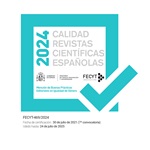Humanismo: propuestas y medidas sobre mendicidad y pobreza en el siglo XVI. (RI §414151)

Humanism: proposal and measures to do with begging and poverty in the 16th century. -
Pedro Fernández Santiago y Jesús Fernández Rodríguez
La pobreza ha suscitado reacciones contradictorias, incluso en una misma época, la permanente presencia de la pobreza en la vida cotidiana de las sociedades, ha sido alimentada por las creencias religiosas y políticas, la legislación ha prestado especial atención a las situaciones de pobreza y/o necesidad, regulando dichas actividades. Los grandes pensadores humanistas españoles del siglo XVI destacan y examinan la pobreza desde una vertiente sociológica en la que se distingue claramente la discusión entre pobre fingidos y pobres verdaderos, la pobreza deja de situarse únicamente en el mundo rural para comenzar a ser una amenaza para la incipiente burguesía de las ciudades.
Introducción. I. La pobreza en el mundo medieval. II. Algunas razones para un contexto social y económico de España en el siglo XVI. 1. El tiempo de la Reforma y Contrarreforma. 2. El Humanismo renacentista y pobreza. 3. Humanismo y reforma social. 4. Reformadores y propuestas: acción social durante el Renacimiento. 5. El debate sobre la pobreza en la España del siglo XVI. 5.1. Juan Luis Vives. 5.2. Domingo de Soto. 5.3. Juan de Robles. 5. 4. Miguel de Giginta. 5.5. Pérez de Herrera. III. LA VITALIDAD DEL PENSAMIENTO HUMANISTA Y LAS MEDIDAS PROPUESTAS RESPECTO A LA POBREZA EN EL SIGLO XVI Y SU CONTRAPUNTO EN LA ACTUALIDAD. IV. MEDIDAS MUNICIPALES RESPECTO A LA ERRADICACIÓN DE LA MENDICIDAD EN ESPAÑA EN LA ACTUALIDAD. V. CONCLUSIONES. BIBLIOGRAFÍA.
The social phenomenon of poverty brings contradictory reactions in every age; the ideas about its nature may have a political or religious basis but, from legal point of view, special attention has been paid to the control of its various and unwanted manifestations.
One of the great subjects of debate of the 16th century among Spanish humanists was that of poverty, especially the distinction between genuine and false poors, at a time when poverty ceases to be a rural phenomenon and become in threat to the incipient bourgeoisie of the European cities.
Introduction. I. Poverty in the Middle Ages. II. A few reasons for a study on the social and economic context of Spain in the 16th century. 1. The Reformation and Counter-reformation period. 2. Renaissance humanism and its attitude to poverty. 3. Humanism and social reform. 4. Social actions in the Renaissance . 5. The debate of poverty in the 16th century in Spain. 5.1. Juan Luis Vives. 5.2. Domingo de Soto. 5.3. Juan de Robles. 5. 4. Miguel de Giginta. 5.5. Pérez de Herrera. III. Municipal regulations in relation to the eradication of begging in contemporary Spain. QUOTED LITERATURE.

 DIRECTORA
DIRECTORA